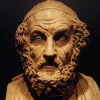Be both a speaker of words and a doer of deeds.
[Μύθων τε ῥητῆρ’ ἔμεναι πρηκτῆρά τε ἔργων.]
Homer (fl. 7th-8th C. BC) Greek author
The Iliad [Ἰλιάς], Book 9, l. 442 (9.442) (c. 750 BC) [tr. Leaf/Lang/Myers (1891)]
(Source)
Phoenix, on what he was sent to teach Achilles as a child to become. (Source (Greek)). Alternate translations:That thou might'st speak, when speech was fit, and do, when deeds were done,
Not sit as dumb, for want of words, idle, for skill to move.
[tr. Chapman (1611)]To shine in councils and in camps to dare.
[tr. Pope (1715-20)]Both elocution and address in arms.
[tr. Cowper (1791)]An orator in words and a performer in deeds.
[tr. Buckley (1860)]Be both a speaker of words and a doer of deeds.
[tr. Murray (1924)]A speaker of words and one accomplished in action.
[tr. Lattimore (1951)]A man of eloquence and action.
[tr. Fitzgerald (1974)]A man of words, and a man of action, too.
[tr. Fagles (1990), l. 538]To be both a speaker of words and a doer of actions.
[tr. Merrill (2007)]To be a speaker of words and a doer of deeds.
[tr. @Sentantiq (2016)]

